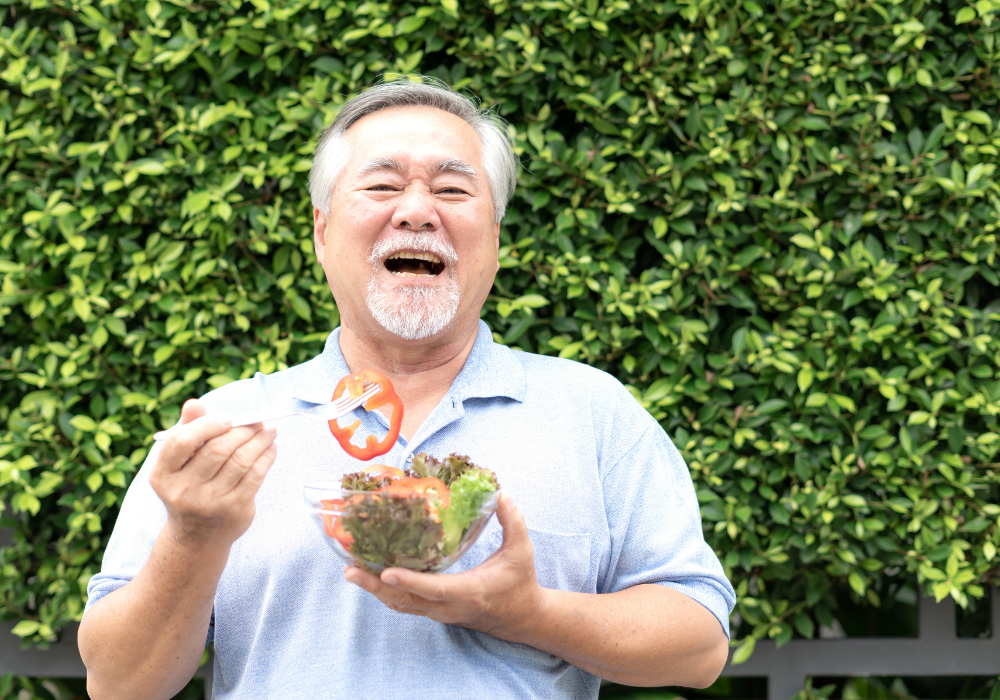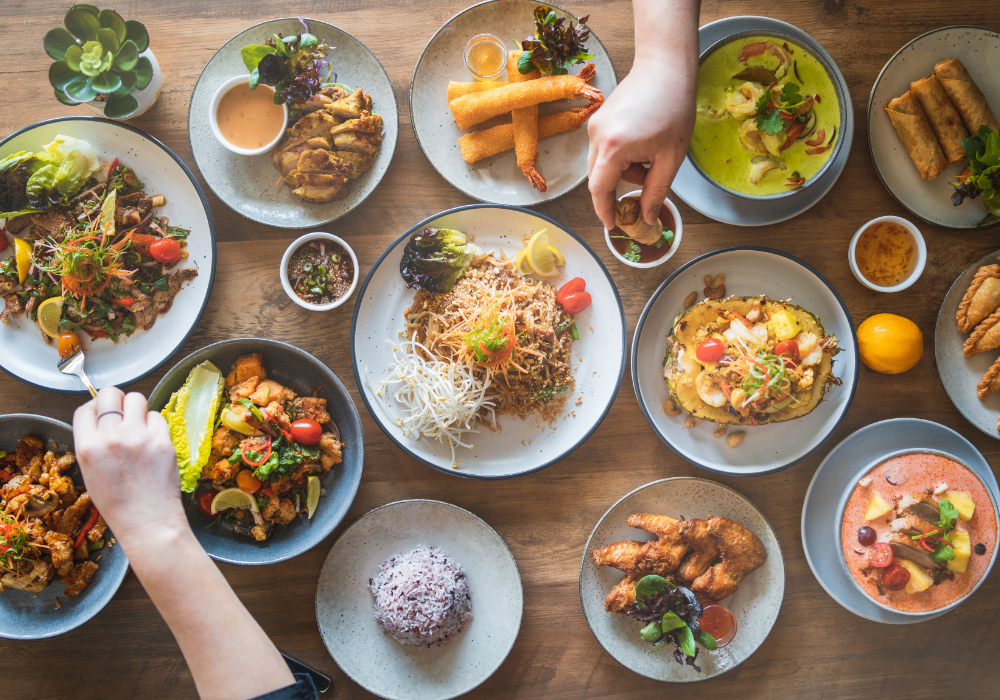Eat with intention, find your calm, and make every meal a moment of Zen.

Most meals feel like a race against time. Food gets scarfed down between meetings, scrolled past on screens, or inhaled so quickly that flavors barely register. Eating on autopilot might be efficient, but it robs the body and mind of a powerful opportunity to reset, recharge, and relax. Stress levels drop when food is enjoyed with awareness. Digestion improves, cravings lessen, and meals become more satisfying when the act of eating slows down.
Mindfulness doesn’t require a meditation cushion or chanting over your plate. Small, barely noticeable habits can turn an ordinary meal into a calming ritual without making anyone at the table raise an eyebrow. The trick is to stay present in subtle ways—paying attention to flavors, chewing more intentionally, or taking a deep breath before diving in. These effortless techniques bring peace to every bite, transforming routine meals into moments of mindfulness without looking strange.
1. Hit the brakes and let each bite have its moment.

Forks move fast when the mind is somewhere else. Meals disappear in minutes, leaving behind a full stomach but an empty experience. Slowing down gives food a chance to be enjoyed, turning every bite into something more than just fuel. It’s not about overanalyzing every mouthful but about letting flavors, textures, and aromas actually register before the next bite rushes in.
Pacing meals doesn’t require rigid rules or counting chews. Research by Harvard Medical School indicates that eating slowly allows time for fullness signals to reach the brain, reducing the likelihood of overeating.
A simple pause between bites, a moment to notice how food tastes, or setting utensils down mid-meal creates a natural slowdown. This small shift makes meals feel more satisfying, improves digestion, and prevents that uncomfortable, overstuffed feeling that comes from eating too fast.
2. Wake up your senses before taking that first bite.

Plates hold more than just food—they carry colors, aromas, and textures waiting to be noticed. Engaging the senses before eating—such as observing colors, smelling aromas, and feeling textures—can enhance mindfulness and overall meal satisfaction, as discussed in a study published by The Library of Medicine.
Smelling a dish before tasting it, noticing the colors of ingredients, or feeling the warmth of a bowl in your hands activates the senses in a way that naturally brings mindfulness to the moment.
Crunchy foods provide instant feedback with sound, creamy textures feel indulgent on the tongue, and different spices bring unexpected surprises. Focusing on just one sensory detail per meal keeps the mind engaged without feeling like extra effort. Meals stop being something to rush through and start feeling like something to experience.
3. Take a deep breath before lifting your fork.

Stress follows people to the table, sneaking into meals before the first bite is even taken. A deep breath before eating signals the body to shift gears, moving from tension to relaxation. Digestion works best when the body isn’t in fight-or-flight mode, and one slow inhale and exhale before eating helps make that transition.
Rushing into meals while distracted makes food feel less satisfying and can lead to overeating. A single, intentional breath creates a mental pause, breaking the cycle of mindless eating. According to Kirby Branciforte for Wegmans, this subtle, effortless practice transforms meals from automatic routines into moments of calm, enhancing the overall dining experience.
4. Drop the fork between bites and break the speed cycle.

Plates shouldn’t be empty before the brain has time to catch up. Eating too fast tricks the body into thinking it needs more food than it does, leading to that overly full, sluggish feeling after meals. Setting utensils down between bites forces a natural pause, allowing time for the body to register fullness and for flavors to actually be enjoyed.
Chewing longer makes food more satisfying, while shorter gaps between bites help slow the rush to finish. This simple habit prevents overeating, keeps digestion running smoothly, and makes meals feel like an experience rather than just another task to check off the list.
5. Zoom in on one flavor and let it take center stage.

Meals have a lot going on—sweet, salty, spicy, crunchy, smooth. Instead of letting everything blend together, picking one element to focus on turns eating into an effortless meditation. The crispness of a fresh apple, the tang of citrus, or the warmth of cinnamon in a dish becomes a way to stay present in the moment.
This trick doesn’t require extra time or effort, just a brief pause to notice what stands out in each bite. Savoring a single taste deepens the eating experience, making meals more satisfying. Food stops feeling like background noise and becomes something to actually enjoy.
6. Take a quiet moment to appreciate the journey your food took to reach your plate.

Meals often feel like a routine task, but every ingredient has a story. From the farmers who grew the produce to the cooks who prepared the dish, food travels through many hands before it’s ready to eat. A small moment of gratitude—whether for the meal itself, the effort behind it, or the nourishment it provides—shifts eating from something automatic to something intentional.
Expressing appreciation doesn’t have to be obvious or ceremonial. A simple pause to acknowledge the meal before taking the first bite is enough. Recognizing the effort behind food creates a mindful connection to what’s being eaten, making each bite more satisfying and meaningful.
7. Chew slowly and give your food the attention it deserves before swallowing.

Most people barely give their food a chance to be tasted before it’s gone. Rushing through meals means flavors are missed, digestion is strained, and the body doesn’t have time to process fullness. Slowing down and chewing more than usual enhances both the flavor and the overall eating experience. Chewing thoroughly also helps break food down properly, allowing the body to absorb nutrients more efficiently.
A few extra seconds spent chewing each bite turns eating into a moment of mindfulness, naturally preventing overeating and making meals feel more enjoyable. Food deserves to be experienced, not just consumed.
8. Align each bite with a steady breath to create a calming rhythm while eating.

Meals and breathing can work together in a way that feels effortless. Taking a deep inhale before picking up a fork, chewing while exhaling, and pausing for another breath before the next bite creates a natural, steady pace. This small adjustment keeps eating from becoming rushed and helps meals feel more balanced.
A relaxed breath helps the nervous system shift into a state where digestion works more efficiently. Eating while stressed or distracted can leave the stomach unsettled, but syncing meals with mindful breathing keeps the body calm and focused. A steady breath brings presence to each bite without making mindful eating feel like a chore.
9. Pause when you feel mostly full to check if your body actually needs more food.

Eating until stuffed is a common habit, but it often leads to feeling sluggish and uncomfortable afterward. The brain takes time to register fullness, which means stopping around 80% full gives the body a chance to process whether it actually needs more food or if eating is continuing out of habit. A brief pause doesn’t mean depriving yourself of what you love—it simply allows a moment to check in.
Fullness signals are easy to override when distracted, but listening to them prevents overeating and helps meals leave you feeling satisfied instead of overly full. Developing this habit strengthens the body’s natural ability to regulate hunger.
10. Treat the last bite of your meal as a mindful way to signal completion.

The final bite of a meal is just as important as the first. Instead of rushing to finish or immediately moving on to the next task, treating the last bite with awareness creates a sense of closure. Noticing its texture, flavor, and temperature turns it into a small but powerful moment of mindfulness.
Ending a meal with intention helps prevent unnecessary snacking and creates a natural transition out of eating mode. Rather than letting meals fade into distraction, giving the last bite attention makes the entire experience feel more complete. Food is more satisfying when it’s enjoyed fully from beginning to end.